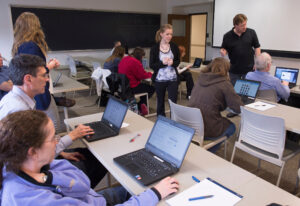
As you start your college exploration and planning process, consider common factors that can shape decisions about which college is right for you. Don’t stress over finding the “perfect” college. There isn’t one. Great colleges and universities exist everywhere! This is all about finding the “right” college for you.
1. Location and Distance from Home
A large factor in your decision-making process involves where the university is located. How far do you want to be from home? Are you interested in an urban setting? Or would a more rural or suburban campus be ideal? If you plan to commute, how long do you want your commute to be?
2. Total Cost of Attendance and Affordability
How much it will cost to attend a college or university will factor into your decision. Make sure to look beyond just the cost of tuition and research fees to also consider room and board, meal plans, books, transportation, technology, and more. Each UW university provides a Net Price Calculator that can give you a better idea of total cost based on information you provide. Make sure you complete the FAFSA (if eligible) each year to ensure that you get access to all grants and loans available to you. Apply for scholarships, too. And ask questions! Don’t assume you can’t afford college. Ask questions at the Financial Aid Office to explore all options.
3. Available Majors/Academic Programs
If you have some ideas about the academic programs that support your career interests, make sure those are available at the universities you consider. Also look into how the university supports students who change their minds about their interests along the way.
4. Class Size and Campus Size
Class size can have a big impact on your ability to learn. Consider the differences between small, discussion-based classes and large lecture classes. As you explore college options, learn about typical class sizes and how many classes you might have that are small or large. What feels right for you?
5. Campus Life
Think about the kind of experiences you want to have when you’re not in class. Do you want to live on campus? What kinds of activities are available on campus and in the surrounding community? Can you study abroad or get involved in research? Ask what students do on the weekends. Find out about clubs and organizations. If athletics and fitness are your thing, how can you get involved? Try to find a college environment that feels safe and welcoming while offering you opportunities to grow, expand your horizons, and engage in what you enjoy.
6. Success Resources and Opportunities
The most successful students take advantage of the range of services and resources provided on campus. As you explore your choices, investigate academic support resources like the library and tutoring services. Explore health and wellness services including support for mental health. Learn how the university will ensure you stay on track to graduate, gain career-ready skills, and help you in your career search or graduate/professional school search.
7. Safety
The college you choose should make you feel safe and secure, so make sure you explore campus safety features and resources as part of your college search. What kinds of on-campus safety measures does the college have in place? What are surrounding neighborhoods like in terms of safety? Every university publishes an annual security report.
8. How Does It Make You Feel?
The more you explore a university, the more you should start to get a feel for the place. Regardless of the programs, opportunities, specific courses, or experiences, it should feel like a safe place for you to grow and learn, as well as a place that will help you pursue your passions and realize your goals and dreams. Your goal is to find a college that will meet you where you are, accept you for who you are, and help you be what you want to be.
As you go through your college search journey, consider the factors above and make a list of ‘must-haves’ and ‘nice-to-haves.’
